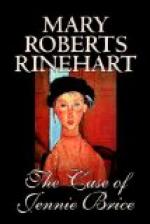“Many actresses conceal defects. She could have worn flesh-colored plaster and covered it with powder. Also, such a scar would not necessarily be seen.”
“Explain that.”
“Most of Jennie Brice’s decollete gowns were cut to a point. This would conceal such a scar.”
Miss Hope was excused, and Jennie Brice’s sister from Olean was called. She was a smaller woman than Jennie Brice had been, very lady-like in her manner. She said she was married and living in Olean; she had not seen her sister for several years, but had heard from her often. The witness had discouraged the marriage to the prisoner.
“Why?”
“She had had bad luck before.”
“She had been married before?”
“Yes, to a man named John Bellows. They were in vaudeville together, on the Keith Circuit. They were known as The Pair of Bellows.”
I sat up at this for John Bellows had boarded at my house.
“Mr. Bellows is dead?”
“I think not. She divorced him.”
“Did you know of any scar on your sister’s body?”
“I never heard of one.”
“Have you seen the body found at Sewickley?”
“Yes”—faintly.
“Can you identify it?”
“No, sir.”
A flurry was caused during the afternoon by Timothy Senft. He testified to what I already knew—that between three and four on Monday morning, during the height of the flood, he had seen from his shanty-boat a small skiff caught in the current near the Ninth Street bridge. He had shouted encouragingly to the man in the boat, running out a way on the ice to make him hear. He had told him to row with the current, and to try to steer in toward shore. He had followed close to the river bank in his own boat. Below Sixth Street the other boat was within rope-throwing distance. He had pulled it in, and had towed it well back out of the current. The man in the boat was the prisoner. Asked if the prisoner gave any explanation—yes, he said he couldn’t sleep, and had thought to tire himself rowing. Had been caught in the current before he knew it. Saw nothing suspicious in or about the boat. As they passed the police patrol boat, prisoner had called to ask if there was much distress, and expressed regret when told there was.
Tim was excused. He had made a profound impression. I would not have given a dollar for Mr. Ladley’s chance with the jury, at that time.
CHAPTER XIII
The prosecution produced many witnesses during the next two days: Shanty-boat Tim’s story withstood the most vigorous cross-examination. After him, Mr. Bronson from the theater corroborated Miss Hope’s story of Jennie Brice’s attack of hysteria in the dressing-room, and told of taking her home that night.
He was a poor witness, nervous and halting. He weighed each word before he said it, and he made a general unfavorable impression. I thought he was holding something back. In view of what Mr. Pitman would have called the denouement, his attitude is easily explained. But I was puzzled then.




